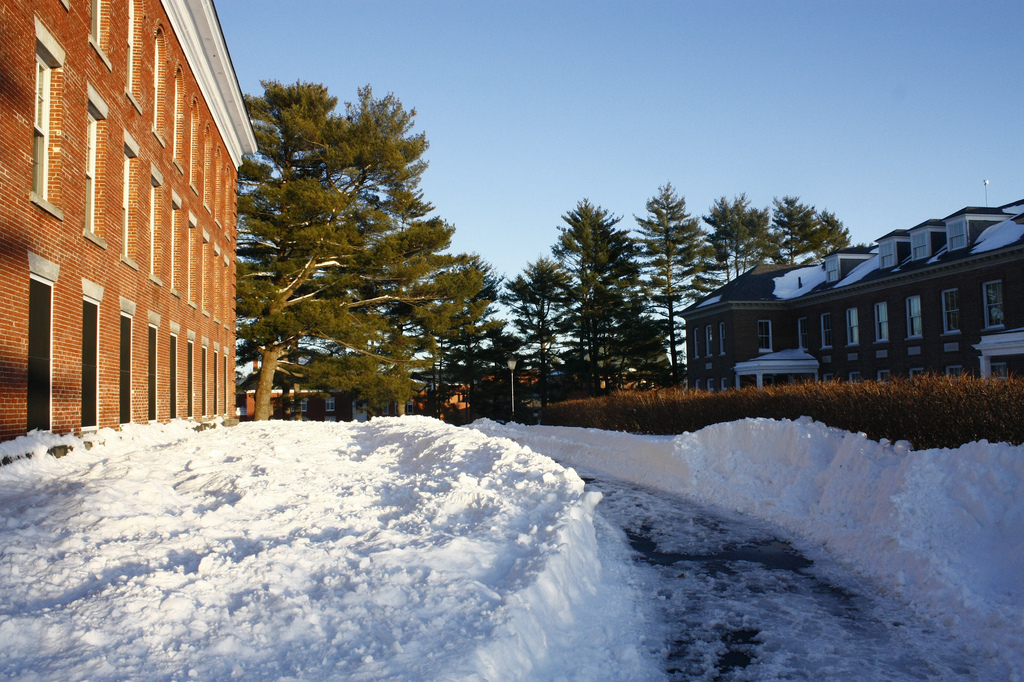

Last Friday, Winter Storm Nemo dumped snow on New England when two low-pressure systems combined to create heavy precipitation and hurricane-force winds. Amherst received 20 inches of snow between Friday night and Saturday morning, closing all college offices after 12:00 p.m., canceling many athletics games and leaving students snowbound after the 4:00 p.m. travel ban.
When the James Brassord, Director of Facilities, first learned of the weather forecast on Thursday morning, he convened a meeting of the Emergency Operations Center (EOC), made up of department heads from across the College, to plan the College’s response to the storm. The EOC worked to ensure that essential staff — which includes campus police, dining services staff and facilities workers involved in snow removal — would be on campus for the storm.
“In anticipation of the snow storm, we advised many staff that they should plan on staying throughout the day Friday and into the weekend,” Brassord said. “We’re well practiced at this; these larger snowstorms have become all too commonplace with climate change. Over the past few years we have had a number of storms like this. We have dedicated staff; we have talented staff who were committed to getting this work done. We provide them with robust equipment and they worked diligently and hard throughout the storm.”
In order to make sure that Valentine Dining Hall would be open for breakfast on Saturday morning, several members of the dining staff stayed overnight in College housing and received transportation to and from Val Friday evening and Saturday morning. Additionally, Charles Thompson, Director of Dining Services, worked to ensure that deliveries scheduled for Saturday arrived on Friday to guarantee that Dining Services had enough food and supplies to last the weekend.
“There were about six or seven of us who stayed over, and the College provided lodging at the Lincoln House, down by the golf course, which they use for guest housing. Campus police transported us there Friday night and picked us up Saturday morning so we could get back here. I did have one gentleman stay in Val overnight on a cot, and we also provided nourishment for the grounds and custodial folks who were here overnight shoveling and plowing. It wasn’t a lot, but we had coffee and pastries set up,” Thompson said.
The College faced several challenges returning the campus to normal functioning. The high winds and heavy snowfall made it difficult for facilities staff to remove snow as fast as they would in a less severe storm, according to Brassord.
“The biggest challenge in this storm was the high winds that resulted in the drifting of the snow. If it’s a tamer snowstorm, typically you remove and plow the snow once, but because of the drifting snow it was a continual effort to try to keep the roadways and walkways open,” Brassord said. “Many staff were here for countless hours, and it’s tough, back-breaking work. They are so dedicated and committed, and we’re fortunate to have them keeping the campus safe,” Brassord said.
Additionally, the snowy roads made it difficult for some staff-members to arrive at work, but nevertheless most staff still did their best to make it to work, according to Thompson. However, several athletics teams, who chose to remain anonymous, volunteered their services in the dining hall on Saturday, working as servers, dishwashers and food-preparers for breakfast and lunch.
“There were a few folks that called in first thing Saturday morning saying, you know, ‘I’m buried, but I will be there as soon as I can dig myself out.’ By the end of the day, I don’t think we had very many people who didn’t come in at all. They may have missed a portion of their shift, but they’re loyal folks; they do everything they can to get themselves in here because they know that students need to eat. So, we fared pretty well; students seemed to understand that breakfast wouldn’t be the full complement, and lunch was a little different,” Thompson said.